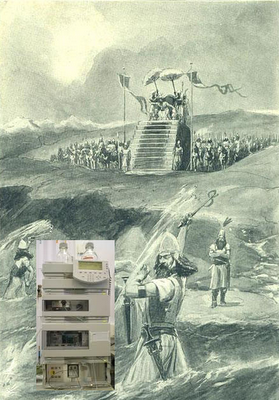Also in this week's C&EN, a letter from a Dr. David A. Marsh to Mrs. Flohr, who aptly summarizes the arrogance of the let-them-eat-persistence crowd. I reproduce Dr. Marsh's letter in full:
Or perhaps Dr. Marsh does not recognize that Mrs. Flohr's daughter is unemployed, and so for her, the glass is 100% empty.
I'm amused at Dr. Marsh's laundry list of ideas to improve Mrs. Flohr's daughter's chances of getting a job in chemistry. Some of them (the resume keywords) are eminently practical. Some of them ("become an invaluable member of committees") are odd, interesting and have more of a long-term payoff. Some of them ("Be open to moving anywhere in the world") are easy to recommend to other people but a lot more difficult to implement. I am curious to know if Dr. Marsh decamped to other countries during his long career.
Finally, "I loved that poor-paying job!" and "Science has given me a wonderful career!" are cold comfort to people who are suffering now. While "all else will follow" may have worked for Dr. Marsh, I suggest that this era in the American chemical enterprise may be different, and past performance is no guarantee of future performance.
I am absolutely flabbergasted that Barbara Flohr would make such negative comments about science education, criticizing a nonprofit organization for encouraging students to participate in science fairs and deriding President Obama’s efforts to increase funding for basic science research (C&EN, March 26, page 4).
I understand the frustration of having a loved one unemployed. But such an attitude is counterproductive. Although it is true that ACS members are experiencing the highest level of unemployment since 1972, that level, 4.6%, is relatively small when one considers that the overall unemployment rate in the U.S. is currently 8.3% (C&EN, March 26, page 10). The glass is 95.4% full, yet Flohr is focusing on the empty portion.
Instead, Flohr should focus on encouraging her daughter to take some positive steps that could enhance her career, such as the following: Consider earning an advanced degree at a top college; concomitantly broaden that chemistry background (e.g., pharmaceutics). Intern at an institution that advances one’s knowledge base and marketability. Participate in professional organizations and become an invaluable member of committees. Develop an international network of professional friends. Publish and present at every opportunity. Be open to moving anywhere in the world to get a job that advances one’s career and knowledge base. If the job is outside the U.S., learn the language and culture. Ensure that the résumé is complete. Remember that human resources personnel may be searching for keywords, which they may not understand. Your résumé may be selected based on acronyms like IR, HPLC, NMR, GC, MS, IND, NDA, PLGA, MAA, etc. If infrared spectrometry appears in the résumé but IR does not, there is a fair likelihood that that keyword will be missed on an HR search.
Above all, keep a positive attitude. Institutions want to hire scientists who are not just smart but also enthusiastic, energetic, and hardworking.
Since 1976, when I received my doctorate, my career changes have always been focused on finding jobs that challenged me to learn new fields within science. My first six years after graduation were financially quite difficult. But I broadened my career; I learned to synthesize new drugs, test them in vitro and in vivo, radiolabel the molecules, and follow the pharmacokinetics of key actives. I loved that poor-paying job!
Science has given me a wonderful career! My advice: Seek knowledge, love science, and all else will follow.
By David A. MarshPerhaps Dr. Marsh is unaware that the 4.6% unemployment for ACS members was measured in March 2011 and the latest BLS number is 6.1% (estimated over the entirety of 2011) -- perhaps the glass is 93.9% full. Maybe Dr. Marsh is not aware that the latest number for unemployment (2009 data) for new B.S. chemistry graduates is 15% -- and so the glass might be 85% full.
Irvine, Calif
Or perhaps Dr. Marsh does not recognize that Mrs. Flohr's daughter is unemployed, and so for her, the glass is 100% empty.
I'm amused at Dr. Marsh's laundry list of ideas to improve Mrs. Flohr's daughter's chances of getting a job in chemistry. Some of them (the resume keywords) are eminently practical. Some of them ("become an invaluable member of committees") are odd, interesting and have more of a long-term payoff. Some of them ("Be open to moving anywhere in the world") are easy to recommend to other people but a lot more difficult to implement. I am curious to know if Dr. Marsh decamped to other countries during his long career.
Finally, "I loved that poor-paying job!" and "Science has given me a wonderful career!" are cold comfort to people who are suffering now. While "all else will follow" may have worked for Dr. Marsh, I suggest that this era in the American chemical enterprise may be different, and past performance is no guarantee of future performance.










